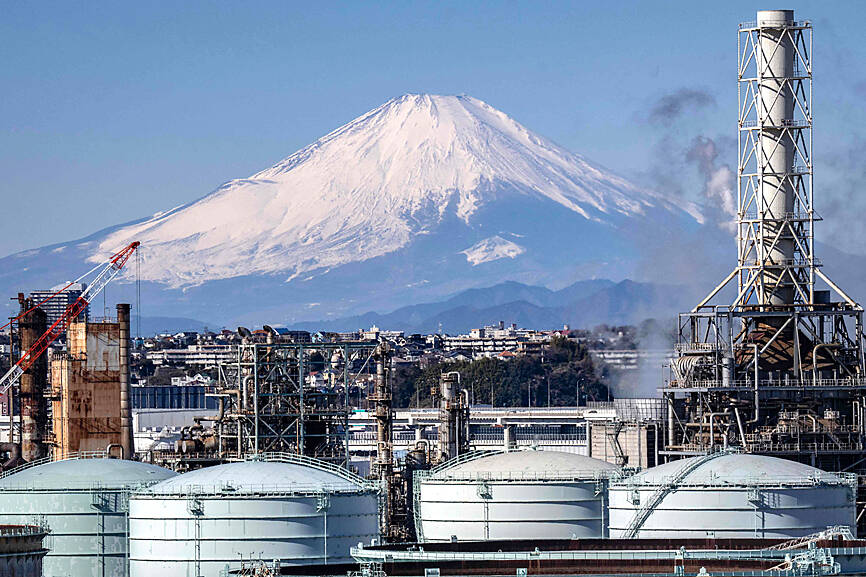A man in his 20s was airlifted from Japan’s Mount Fuji and then rescued again from its steep slopes just days later because he returned to find his mobile phone, local media reported.
Police said that the Chinese university student, who lives in Japan, was found on Saturday by another off-season hiker on a trail more than 3,000m above sea level.
“He was suspected of having altitude sickness and was taken to hospital,” a police spokesman in Shizuoka region said yesterday.

Photo: AFP
Later, officers discovered that the man was the same one who had been rescued on Mount Fuji four days previously, broadcaster TBS reported.
Police could not immediately confirm the reports, which said the man — having been rescued by helicopter on Tuesday last week — returned on Friday to retrieve his mobile phone, which he forgot to bring with him during the first rescue.
It was not known whether he was able to find his phone, reports said, citing unnamed sources.
Mount Fuji, an active volcano and Japan’s highest peak, is covered in snow most of the year.
Its hiking trails are open from early July to early September, a period when crowds trudge up the steep, rocky slopes through the night to see the sunrise.
People are dissuaded from hiking outside of the summer season because conditions can be treacherous.
The symmetrical 3,776m mountain has been immortalized in countless artworks, including Hokusai’s Great Wave. It last erupted about 300 years ago.
In a bid to prevent overcrowding on Mount Fuji, authorities last year implemented an entry fee and cap on numbers for the most popular Yoshida Trail.
Starting this summer, hikers on any of Mount Fuji’s four main trails are to be charged an entry fee of ¥4,000 (US$28).

FORUM: The Solomon Islands’ move to bar Taiwan, the US and others from the Pacific Islands Forum has sparked criticism that Beijing’s influence was behind the decision Tuvaluan Prime Minister Feletei Teo said his country might pull out of the region’s top political meeting next month, after host nation Solomon Islands moved to block all external partners — including China, the US and Taiwan — from attending. The Pacific Islands Forum (PIF) leaders’ meeting is to be held in Honiara in September. On Thursday last week, Solomon Islands Prime Minister Jeremiah Manele told parliament that no dialogue partners would be invited to the annual gathering. Countries outside the Pacific, known as “dialogue partners,” have attended the forum since 1989, to work with Pacific leaders and contribute to discussions around

END OF AN ERA: The vote brings the curtain down on 20 years of socialist rule, which began in 2005 when Evo Morales, an indigenous coca farmer, was elected president A center-right senator and a right-wing former president are to advance to a run-off for Bolivia’s presidency after the first round of elections on Sunday, marking the end of two decades of leftist rule, preliminary official results showed. Bolivian Senator Rodrigo Paz was the surprise front-runner, with 32.15 percent of the vote cast in an election dominated by a deep economic crisis, results published by the electoral commission showed. He was followed by former Bolivian president Jorge “Tuto” Quiroga in second with 26.87 percent, according to results based on 92 percent of votes cast. Millionaire businessman Samuel Doria Medina, who had been tipped

Outside Havana, a combine belonging to a private Vietnamese company is harvesting rice, directly farming Cuban land — in a first — to help address acute food shortages in the country. The Cuban government has granted Agri VAM, a subsidiary of Vietnam’s Fujinuco Group, 1,000 hectares of arable land in Los Palacios, 118km west of the capital. Vietnam has advised Cuba on rice cultivation in the past, but this is the first time a private firm has done the farming itself. The government approved the move after a 52 percent plunge in overall agricultural production between 2018 and 2023, according to data

ELECTION DISTRACTION? When attention shifted away from the fight against the militants to politics, losses and setbacks in the battlefield increased, an analyst said Recent clashes in Somalia’s semi-autonomous Jubaland region are alarming experts, exposing cracks in the country’s federal system and creating an opening for militant group al-Shabaab to gain ground. Following years of conflict, Somalia is a loose federation of five semi-autonomous member states — Puntland, Jubaland, Galmudug, Hirshabelle and South West — that maintain often fractious relations with the central government in the capital, Mogadishu. However, ahead of elections next year, Somalia has sought to assert control over its member states, which security analysts said has created gaps for al-Shabaab infiltration. Last week, two Somalian soldiers were killed in clashes between pro-government forces and